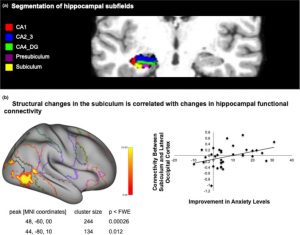Mindfulness is Related to Improved Psychological Health During the Covid-19 Pandemic.
By John M. de Castro, Ph.D.
“During the current pandemic, there is so much uncertainty concerning the future, and many threats to our security (physical, social, emotional, and financial). It is totally natural and normal to feel anxious, fearful, and frustrated. . . Mindfulness can help us acknowledge this situation, without allowing us to be carried away with strong emotions; it can, in turn, help bring ourselves back to a centered calm. Only then can we see more clearly what it is we have control over and what it is that we do not.” – Michigan Medicine
Modern living is stressful under the best of conditions. But with the Covid-19 pandemic the levels of stress have been markedly increased. These conditions markedly increase anxiety. This is true for everyone but especially for healthcare workers and people caring for patients with COVID-19 and for people with pre-existing conditions that makes them particularly vulnerable. But it is also true for healthy individuals who worry about infection for themselves or loved ones.
The COVID-19 pandemic has also produced considerable economic stress, with loss of employment and steady income. For the poor this extends to high levels of food insecurity. This not only produces anxiety about the present but also for the future. It is important for people to engage in practices that can help them control their responses to the stress and their levels of anxiety. Mindfulness practices have been found routinely to reduce the psychological and physiological responses to stress, reduce anxiety levels, and improve mood. But there is a need to investigate the relationships of mindfulness to psychological health in relation to knowledge concerning Covid-19.
In today’s Research News article “Knowledge of COVID-19 and Its Influence on Mindfulness, Cognitive Emotion Regulation and Psychological Flexibility in the Indian Community.” (See summary below or view the full text of the study at: https://www.frontiersin.org/articles/10.3389/fpsyg.2020.589365/full?utm_source=F-AAE&utm_medium=EMLF&utm_campaign=MRK_1490157_69_Psycho_20201124_arts_A ) Dubey and colleagues recruited adults in India during the Covid-19 lockdown. They were measured online for their knowledge and awareness of Covid-19, depression, anxiety, perceived stress, mindfulness, emotion regulation, and acceptance of private experiences or experiential avoidance.
They found that the greater the amount of knowledge of Covid-19 the lower the levels of perceived stress, anxiety, catastrophizing, and depression and the higher the levels of mindfulness and psychological flexibility. In addition, they found that the higher the levels of mindfulness, the higher the levels of knowledge of Covid-19 and psychological flexibility and the lower the levels of perceived stress, anxiety, catastrophizing, and depression.
These findings are correlational and thus caution must be exercised in concluding causation. But in previous research it has been shown that mindfulness produces better emotion regulation by increasing psychological flexibility and by lowering the levels of psychological distress by lowering the levels of perceived stress, anxiety, catastrophizing, and depression. So, the relationships seen here are likely caused by mindfulness.
It is interesting that knowledge and awareness of Covid-19 appears to be crucial in dealing with its psychological impact on the individual. Higher levels of knowledge appear to mitigate the negative emotional effects of the pandemic, perhaps by improving the ability to be cognitively flexible in coping with it. When it comes to the pandemic ignorance is not bliss, rather it evokes grater psychological distress.
The Covid-19 lockdown was obviously a time of great fear and anxiety, not only for the individual’s physical health but also for their economic stability. Being able to deal with the negative emotions produced is essential not only for the individual’ mental health but also for evoking constructive and adaptive responses. Mindfulness and knowledge of the pandemic appear to be important for doing just that.
So, mindfulness is related to improved psychological health during the Covid-19 Pandemic.
“These are trying times, but incorporating mindful practices into your daily routine can help calm anxiety and build healthy coping skills.” – Rae Jacobson
CMCS – Center for Mindfulness and Contemplative Studies
This and other Contemplative Studies posts are also available on Google+ https://plus.google.com/106784388191201299496/posts and on Twitter @MindfulResearch
Study Summary
Dubey N, Podder P and Pandey D (2020) Knowledge of COVID-19 and Its Influence on Mindfulness, Cognitive Emotion Regulation and Psychological Flexibility in the Indian Community. Front. Psychol. 11:589365. doi: 10.3389/fpsyg.2020.589365
ABSTRACT
The current global pandemic caused by COVID-19 has brought about an immense effect on the mental health of the general public. Considering the escalation in number of cases, mankind is facing a myriad of psychological problems, ranging from those related to taking precautions and maintaining safety to the ones caused by separation and bereavement. The current study aims to explore whether there is a significant difference between individuals with excellent, good, fair and vague knowledge of COVID-19 with respect to depression, anxiety, stress, level of mindfulness, specific cognitive emotion regulation strategies and psychological flexibility; to find out whether there is any significant relationship among these variables; and to determine whether knowledge of COVID-19, level of mindfulness, specific cognitive emotion regulation strategies and psychological flexibility are significant predictors of depression, anxiety and stress in the sample of the current study. The sample consisted of 402 individuals selected from the community following the research criteria. Data was collected using digital consent form, information schedule and questionnaires, from 3rd May to 13th May, 2020. The questionnaires consisted of a semi-structured interview schedule to assess knowledge of COVID-19, Depression, Anxiety and Stress Scale – 21, Five Facet Mindfulness Questionnaire-Short Form, Cognitive Emotion Regulation Questionnaire-Short version and Acceptance and Action Questionnaire-II. The data was statistically analyzed using analysis of variance test, correlational analysis and linear regression. The findings show that significant differences were present among individuals having varying degrees of knowledge of COVID-19 with respect to anxiety, level of mindfulness and psychological flexibility. Significant relationships were found to be present among the variables of the present study, having differing trends brought forward by the COVID-19 crisis. Certain socio-demographic characteristics and study variables were found to significantly predict the existing levels of depression, anxiety and stress in the current sample. The study suggests the necessity to formulate and implement appropriate mindfulness-based therapeutic interventions to address the mental health concerns arising as a result of the pandemic.









